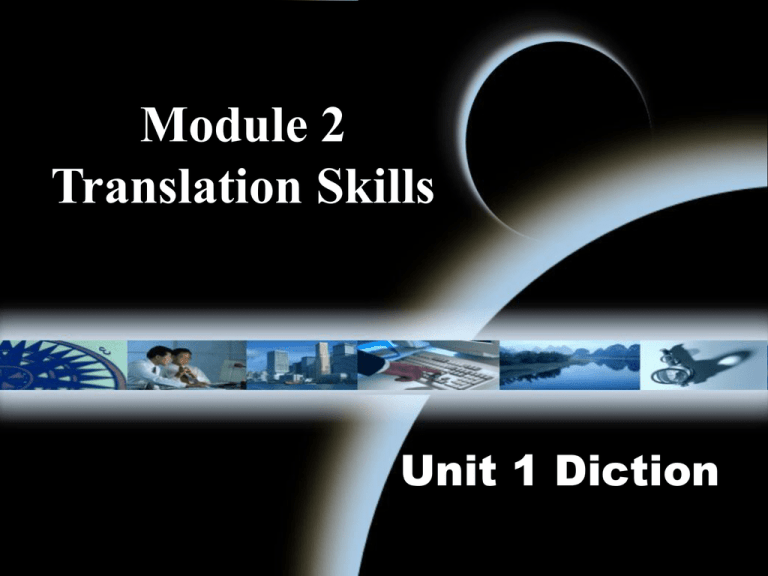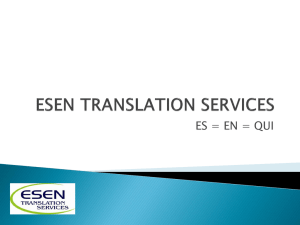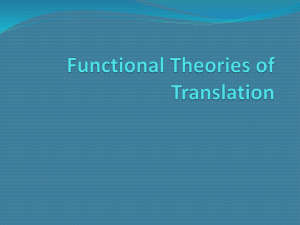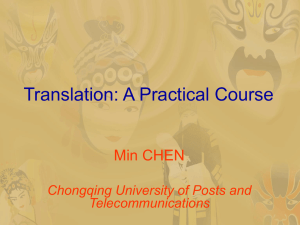Translation skills
advertisement

Module 2 Translation Skills Unit 1 Diction 1. Correspondence between English and Chinese at Word Level 1)Word-for-word correspondence • Marxism • 激光 • 马克思主义 • laser 2)One word with multiple equivalents of the same meaning • Wife • 妻子、爱人、夫人、老婆、老伴、媳妇、堂客、 内人…… • Potato: • 马铃薯、洋芋、土豆、山药蛋…… • 人: • human being, man, people, person…… 3)One word with several equivalents of different meanings • Cousin: • 堂兄、堂弟、堂姐、堂妹、表哥、表弟、表姐、 表妹、卿…… • President: • 总统、总裁、主席、董事长、议长、会长、社 长、校长…… 走 • • • • • • • • • • walk Saunter (闲逛, 漫步) Amble (缓行, 溜蹄) Stride (大步行走) Trudge (跋涉) Trapes (漫步) • • • • • • • • • Shamble (蹒跚地走, 摇摇晃晃地走) Prance (昂首阔步) Scamper (奔跳) Clump (重踏着走), tiptoe…… 4)Equivalents interwoven with one another • • • • talk speak say tell 说 讲 述 道 5)Words without equivalents • • • • • • Teenager 13-19岁的青少年 Clock-watcher 老是看钟等下班的人 阴 (in Chinese thought) the soft, inactive, female principle or force in the world • 阳 • (in Chinese thought) the strong, active, male principle or force in the world 2. Methods of discriminating the original meaning of an English word 1)Judging from the word formation 2)Judging from the references • Health is above wealth, for this cannot give so much happiness as that. • 健康比财富更重要,因为财富/后者不能像 健康/前者那样给人那么多幸福。 3) Judging from the context and collocation head 1. 2. 3. 4. 5. 6. 7. 8. 9. 10. 11. He was badly wounded in the ~. You should use your ~ a bit. He has a good ~ for mathematics. The dinner cost us five dollars a ~. Prick with the ~ of a needle. He was standing at the ~ of the staircase. Let’s discuss the question under five ~s. The ~ of his bed was piled with books. Present at the meeting were the ~s of government of the four countries. ~s or tails? Where is the ~? 他头部受重伤。 你该用一下自己的头脑。 他的数学能力很强。 这顿饭花去我们每人5块钱。 用针尖挑。 他站在楼梯的顶端。 让我们分五个题目来讨论这 个问题。 8. 他的床头堆满了书。 9. 出席会议的有四国政府的首 脑。 10.正面还是反面? 11.厕所在那里(船上用语) 1. 2. 3. 4. 5. 6. 7. 3) Judging from different braches of learning and specialties base • • • • • in lexicology词根; in business本金; in painting底漆; in survey基线; in military根据地 3. Techniques of translating a given English word 1) Deduction • boomer: a person born in the marked rise in birthrate • 生育高峰期出生的人 2) Transplant • microwave微波 • supermarket超级市场 3) Extension引申法 1. 2. 3. 4. Bottleneck brain trust brain drain It is more than transient everydayness. 1. 瓶颈—交通狭口—阻塞 2. 脑托拉斯—智囊团 3. 脑排干—人才外流—人才 流失 4. 这远非一时的柴米油盐问 题。 4) Substitution • • • • kill sb. as an example 杀一儆百 The same is not true with a mortal illness. 如果是得了不治之症(绝症),情况就不一 样了。 5) Explanation • • • • • • a throwaway society 一个大手大脚、浪费成风的社会 redshirt红衫运动员; 美国大学中在体育方面有发展前途的学生 swan song 天鹅临死时的叫声;绝唱、辞世之作 6) Combination合并法 • • • • • so subtle and careful an observer • 有害的工作造成的身心困顿 一位如此精细的观察者 a grim and tragic Christmas 一个惨淡的圣诞节 the body and mind cramped by noxious work 7) Transliteration • • • • • • Wall Street 华尔街 The Times 泰晤士报 Clone 克隆 8) Pictographic translation • • • • H-beam 工字梁 O-ring 环形圈 Module 2 Translation Skills Unit 2 Introduction to Translation Skills Skill I: Conversion 1. Conversion into verbs • English sentences contain no more than one predicate verb, while in Chinese it is not unusual to have clusters of verbs in a simple sentence. • Families upstairs have to carry pails to the hydrant downstairs for water. • 住在楼上的人家得提着水桶去楼下的水龙头打水。 1)Nouns converted into verbs • The sight and sound of our jet planes filled me with special longing. • 看到我们的喷气式飞机,听见隆隆的机声, 我感到心驰神往。 2)prepositions converted into verbs • “Coming!” She skimmed over the lawn, up the path, up the steps, across the verandah, and into the porch. • “来啦!”她蹦跳着越过草地,跑上小径,跨 上台阶,穿过凉台,进了门廊。 3) adjectives converted into verbs • Many English adjectives after a link verb indicating one’s consciousness, feelings, emotions, desires, etc., are always converted into Chinese verbs. • Doctors have said that they are not sure they can save his life. • 医生说他们不敢肯定能否救得了他的命。 4)adverbs into verbs • As he ran out, he forgot to have his shoes on. • 他跑出去时,忘记了穿鞋。 2. Conversion into nouns 1) verbs converted into nouns • Such materials are characterized by good insulation and high resistance to wear. • 这些材料的特点是:绝缘性好,耐磨性强。 • The design aims at automatic operation, easy regulation, simple maintenance and high productivity. • 设计的目的在于自动操作,调节方便,维护简易, 生产率高。 2) adjectives into nouns • They did their best to help the sick and the wounded. • 他们尽了最大的努力帮助病号和伤员。 3) pronouns into nouns • The result of this experiment is much better than those of previous ones. • 这次实验的结果比前几次实验结果都好得 多。 3. Conversion into adjectives 1) nouns converted into adjective • Independent thinking is an absolute necessity in study. • 学习中的独立思考是绝对必须的。 2) adverbs into adjectives • The pressure inside equals the pressure outside. • 内部的压力和外部的压力相等。 4. Conversion into adverbs 1) Adjectives converted into adverbs • Only when we study their properties can we make better use of the materials. • 只有研究这些材料的特性才能更好地利用 它们。 2) Nouns and verbs into adverbs • I have the honor to inform you that your request is granted. • 我荣幸地通知您,您的请求已经得到批准。 • Rapid evaporation at the heating-surface tends to make the steam wet. • 加热面上的迅速蒸发,往往使蒸汽的湿度变 大。 5. Conversion of sentence elements • Conversion in a broader sense includes the conversion of the “active voice” into the “passive”. Sometimes, it may involve the change of various elements of a sentence, such as from the subject to the object, and vice versa. Examples • As the match burns, heat and light are given off. • 火柴燃烧时发出光和热。 • (from subject to the object) • Care must be taken at all times to protect the instrument from dust and damp. • 应当始终注意保护仪器,不使其沾染灰尘和受 潮。 • (from the subject to the predicate) Examples • • • • • • The baby doubled its weight in a year. 婴儿的体重一年中长了一倍。 (from the subject to the attributive) She behaves as if she were a child. 她的举止像是个孩子。 (from the predicate to the subject) Module 2 Translation Skills Unit 2 Introduction of Translation Skills Skill II: Restructuring 1. Different word order in English and Chinese • Most of the information we have got is through that channel. • 我们的大部分消息是通过那个渠道获得的。 • His address is 3612 Market Street, Philadelphia, PA. 19104, USA. • 他的地址是美国宾夕法尼亚州费城市场街 3612号,邮政编码19104。 1) Interrogative inversion疑问倒装 • What did you do yesterday? • 你昨天干什么来着? 2) Imperative inversion命令倒装 • “Speak you,” said Mr. Black, “Speak you, good fellow!” • 布莱克先生叫到:“说,说吧!伙计!” 3) Exclamatory inversion惊叹倒装 • How dreadful is this place! • 这地方好可怕啊! 4) Hypothetical inversion假设倒装 • Had you come yesterday, you could have seen him here. • 要是你昨天来了,你就会在这里看到他的。 • Young as he is, the little boy has learned a lot. • 尽管这个小男孩尚年幼,可已经学了不少知识。 5) Balance inversion平衡倒装 • Through a gap come an elaborately described ray. • 从一个空洞透出一束精心描绘的光线。 6) Link inversion衔接倒装 • On this depends the whole argument. • 整个争论都以此为论据。 7) Signpost inversion点题倒装 • By strategy is meant something wider. • 战略意义比较广。 8) Negative inversion否定倒装 • Not a word did he say. • 他只字未说。 9) Metrical inversion韵律倒装 • As pants the hart for cooling streams. (Normal order: As the hart pants for cooling streams.) • 像公鹿渴望清凉的小溪一样。 2. Restructuring in EnglishChinese Translation 1) Different sequences in customary word combination • You, he and I • 你我他 • Food, clothing, shelter and transportation • 衣食住行 • Back and forth • 前前后后 • Every means possible • 一切可能的手段 2) Different sequences in customary sentence arrangement • He had to quit the position and went into exile, having been deprived of his power. • 他被剥夺了权力之后,只好离职,流落他乡。 • We had been dismayed at home while reading of the natural calamities that followed one another for three years after we left China in 1959. • 我们于1959年离开了中国。此后,中国连续三年 遭到自然灾害。当我们在国内读到这方面的消息 时,心情颇为低沉。 3) Adverbial clauses in a complex sentence • The government is determined to keep up the pressure whatever the cost it will pay in the end. • 不论最终将付出什么代价,政府决心继续施加压 力。 • The librarians have compiled a card-index catalogue so that they can afford facilities for reference. • 为便于参考起见,图书馆馆员们编制了索引目录 卡。 4) Cases involving adverbials • They, not unexpectedly, did not respond. • 他们没有答复,这完全是意料之中的事。 • Illogically, she had expected some kind of miracle solution. • 她满以为会有某种奇迹般的解决办法,这 显然不合情理。 5) “That” clause used as a judgment or conclusion • I believe equally that it is in the interests of the world as a whole that Europe should increasingly unite and speak with a common voice. • 我同样认为,欧洲应该日益团结起来,并且用同 一个共同的声音说话,这是符合全世界的利益的。 • It was a keen disappointment that I had to postpone the visit I had intended to pay to China in January. • 我原打算在1月访问中国,后来又不得不推迟,这 使我深感失望。 3. Restructuring in ChineseEnglish Translation • • • • • • 社会主义的现代化强国 a powerful, modern, socialist country 一位美国现代优秀作家 an outstanding contemporary American writer 救死扶伤,实行革命的人道主义。 Heal the wounded, rescue the dying, practice revolutionary humanitarianism. Module 2 Translation Skills Unit 2 Introduction of Translation Skills Skill III: Amplification Amplification in English-Chinese Translation 1. Amplification by supplying words omitted in the original • …cell phone…Otherwise, benefits seem murky. • 除此之外,手机的好处似乎就说不清楚了。 • In the evening, after the banquets, the concerts and the table tennis exhibitions, he would work on the drafting of the final communique. • 晚上在参加宴会、出席音乐会和观看乒乓球表演 后,他还得起草最后公报。 2. Amplification by supplying necessary connectives • Heated, water will change into vapor. • 水如果受热就会气化。 3. Amplification by supplying words to convey the concept of plurality • Note that the words “technique” and “technology” require explanation. • 请注意,“技巧”和“技术”这两个词需要解释。 • He stretched his legs which were scattered with scars. • 他伸出双腿,露出腿上的道道伤痕。 • The mountains began to throw their long blue shadows over the valley. • 群山开始向山谷投下一道道蔚蓝色长影。 4. Amplification by supplying words to make an abstract concept clear • After all preparations were made, the plane took off. • 一切准备工作就绪之后,飞机就起飞了。 • Most people in America, minority people in particular, are convinced that injustices exist in their economic system. • 大多数美国人,尤其是少数民族,都确信美国经 济制度中存在着不公正现象。 • Some people were anxious to relax in retirement with all the strains relieved. • 一些人渴望过轻松的退休日子,使自己从一切紧 张状态中解脱出来。 5. Amplification by logical thinking • Air pressure decreases with altitude. • 气压随海拔高度的增加而下降。 6. Amplification by supplying words of generalization • According to scientists, it takes nature 500 years to create an inch of topsoil. • 根据科学家们的看法,自然界要用500年的时间 才能形成一英寸(2.54厘米)厚的表层土壤。 7. Amplification for purpose of rhetoric or coherence • This printer is indeed cheap and fine. • 这部打印机真是物美价廉。 • I like Chinese food. Lots of people do these days. Sort of the fashion. • 我喜欢中国菜。现在很多人都喜欢中国菜,这种 情况算是有点儿赶时髦吧! 8. Amplification by repetition • They could sense her (Titanic) mass, her eerie quiet and the ruined splendor of a lost age. • 他们体会到它(泰坦尼克号)船体的巨大,感受 到它周围可怕的沉寂,领略到因岁月的流逝而造 成的凄凉景观。 Amplification in ChineseEnglish Translation 1. Amplifying by adding necessary pronouns • 上交翻译之前,必须读几遍,看看有没有要 修改的地方。 • Before handing in your translations, you have to read them over and over again and see if there is anything in them to be corrected or improved. 2. Amplifying by adding necessary articles • 耳朵是用来听声音的器官,鼻子用来嗅气味, 舌头用来尝滋味。 • The ear is the organ which is used for hearing. The nose is used for smelling. The tongue is used for tasting. 3. Amplifying by adding necessary connectives • 虚心使人进步,骄傲使人落后。 • Modesty helps one to go forward, whereas conceit makes one lag behind. • 留得青山在,不怕没柴烧。 • So long as green hills remain, there will never be a shortage of firewood. 4. Amplifying by adding necessary prepositions • • 咱们校门口见吧。 Let’s meet at the school gate. 5. Amplifying by adding necessary background words • • 三个臭皮匠,顶个诸葛亮。 • • 别班门弄斧。 • • 这真是俗话说的“旁观者清”。 Three cobblers with their wits combined equal Zhuge Liang the mastermind. Don’t try to show off your proficiency with the ax before Lu Ban the master carpenter. It is just as the proverb goes, “The onlooker sees most of the game.” Module 2 Translation Skills Unit 2 Introduction of Translation Skills SkilI IV: Omission Omission 减词是指将原文中需要、而译文中又不需要的词语省 去。减省的词语应是那些在译文中保留下来反而使行文累 赘噜嗦、且不合汉语语言表达习惯的词语。减词一般用于 以下两种情况:一是从语法角度进行减省;二是从修饰角 度进行减省。 一、 从语法角度进行减省 英汉两种语言在语法上差异较大,例如:英语有冠词, 而汉语却没有;英语重形合、连接词较多,汉语重意合、 连接词较少;英语中介词丰富,多达280多个,汉语中介 词则较少,只有30来个;英语中经常使用代词,尤其是经 常使用人称代词、关系代词等,而汉语中代词则用得较少; 因此,英译汉时可根据具体情况将冠词、连接词、介词、 代词略去,使译文练达晓畅。 1. From grammatical point of view (1) Omission of pronouns • He put his hands into his pockets and then shrugged his shoulders. • 他将双手放进衣袋,然后耸了耸肩。 • You must always remember not to become conceited. • 切记不可骄傲。 • She seldom absents herself from class. • 她很少缺课。 • I remembered her eyes as she looked at me before she died. • 我忘不了她临死前看着我的那种眼神。 (2) Omission of articles • The moon was slowly rising above the sea. • 月亮慢慢从海上升起。 • Any substance is made up of atoms whether it is a solid, a liquid, or a gas. • 任何物质,不论是固体、液体或气体,都由原子 组成。 (3) Omission of propositions • Smoking is prohibited in public places. • 公共场所不许吸烟。 • Now complaints are heard in all parts of the country. • 现在,举国上下,怨声载道。 (4) Omission of conjunctions • He looked gloomy and troubled. • 他看上去有些忧虑不安。 • One’s mind works fast when it is in great danger. • 人在危机之中,反应很快。(急中生智。) • If I had known it, I would have joined it. • 早知如此,我就参加了。 (5) Omission of verbs • When the pressure gets low, the boiling point becomes low. • 气压低,沸点就低。 (6) Omission of “it” • It was with some difficulty that he found the way to his own house. • 他费了不少劲才找到回家的路。 (7) Omission of other sentence structures • University students who have worked at a job would receive preference over those who had not. • 有工作经验的大学生优先。 • Anything one can imagine, other man can make real. • 有人想得到,就有人做得到。 2. From rhetorical point of view • University applicants who had worked at a job would receive preference over those who had not. • 报考大学的人,有工作经验的优先录取。 • (如果不作省略,译成“报考大学的人,有工作经验 的,比没有工作经验的,优先录取”,就显得累赘。) • Neither party shall cancel the contract without sufficient cause or reason. • 双方均不得无故解除合同。 • (如果译成“...没有原因和理由”的话,就不够精炼。) • There was no snow, the leaves were gone from the trees, the grass was dead. • 没有下雪,但叶落草枯。 • (此句如果译成“...树叶从树上落下来,草也枯萎了” 就嫌累赘。) • There was still the faith that ordinary men are greater than the powers of nature or the mechanisms of man’s hands and will master them all in the end. • 仍然具有这种信念,普通的人要比自然的力量或 人类造出来的机器更伟大,而且最终会控制它们。 • (这里,The mechanisms of man’s hands不必译 为“人类的手造出来的机器”。) Module 2 Translation Skills Unit 2 Introduction of Translation Skills SkilI V: Negation and Affirmation Antonymic Translation 1. ※ ※ ※ ※ ※ ※ • • English affirmation is converted to Chinese negation Keep off the lawn. 请勿践踏草地! Admission by invitation only. 非请莫入。 I do think that it is beyond his power to fulfill the task. 我的确认为要完成这项任务是他力所不及的。 The lecturer spoke above the heads of his audience. 讲演者讲得太深奥,听众听不懂。 • He went to an outdoor phone booth and dialed Chicago, then New York, then San Francisco. Silence. Silence. Silence. • 他到一个户外公用电话亭,先给芝加哥、又给纽约、旧金 山打了电话。没人接听。没人接听。还是没人接听。(忙 音) • • • • • • • He was absent from his own country last year. 他去年不在自己的国家。 He was extremely sorry for the shortness of time. 他对时间不足感到十分抱歉。 The plan as it is leaves much to be desired. 目前这样的方案大有不足之处。 Before I could say“thank you”,the postman had disappeared around the corner. • 我还没来得及说声“谢谢”,邮递员已经在拐角处不见了。 1. English negation is converted to Chinese affirmation • • • • • I can’t remember his name. 我忘了他的名字。 You can't be too careful. 你要特别小心。 If you need any further help, please don’t hesitate to contact us. • 如需帮忙,请随时与我们联系。 • The significance of these incidents wasn't lost on us. • 这些事件引起了我们的重视。 • The doubt was still unsolved after his repeated explanation. • 虽经他一再解释,疑团仍然存在。 • He carelessly glanced through the note and got away. • 他马马虎虎地看看那张便条就走了。 • All the articles are untouchable in the museum. • 博物馆内一切展品禁止触摸。 • Winners are not afraid to do their own thinking and to use their own knowledge. • 成功者敢于独立思考,敢于运用自己的知 识。 • He killed all the chicken infected with the bird flu without exception. • 他把感染了禽流感的鸡一只不留地全都杀 光了。 3. Same English word, with either affirmative or negative equivalents in Chinese • • • • • • • • • • I’m new to the work. 这工作我是生手。(这工作我不熟悉) He is free with his money. 他花钱大手大脚。(他花钱从不吝啬) He realized that he was in trouble. 他意识到遇到麻烦了。(他感到自己的处境不妙) The station is no distance at all. 车站近在咫尺。(车站一点儿也不远) It’s no less than a fraud. 这简直是一场骗局。(这无异于一场骗局) 4. Double negation for emphasis • There is no rule that has no exception. • 任何规则都有例外。 • There is not any advantage without disadvantage. • 有一利必有一弊。 5. Roundabout affirmative间接的肯定结构 • • • • • • • • • • He didn’t half like the girl. 他非常喜欢那姑娘。 I couldn’t feel better. 我觉得身体好极了。 I couldn’t agree with you more. 我太赞成你的看法了。 If that isn’t what I want! 我所要的就是这个呀! He can’t see you quick enough. 他很想尽快和你见面。 6. Some traps in negative structures 否定的陷阱 • The engine didn’t stop because the fuel was finished. • 引擎并不是因为燃料耗尽而停止运转。 • The importance of this conference cannot be overestimated. • 这次会议的重要性无论怎么强调也不过分。 • I shall never be able to stress too much for your kindness. • 不管我怎么感谢你,都不足以报恩于万一。 • • • • • • • • You cannot be too careful in proofreading. 校对时,越仔细越好。 All that glitters is not gold. 发光的不一定都是金子。 Everything is not straightened out. 并非每一个问题都弄清楚了。 You may leave at once for all I care. 你尽可立即离开,我才不管呢。 7. Negation in Chinese-English Translation 1) Negation according to usage习惯用法 • 俗话说,“男儿有泪不轻弹,皆因未到伤心处” 嘛。 • As the saying goes, “Men only weep when deeply hurt.” • Except for the howl of the north wind, the snow-mantled land is silent. 2) Negation for emphasis or rhetorical effect • 这个惨痛的历史教训,我们全党同志一定要永 远记取,引以为鉴。 • No comrade in the Party must ever forget this bitter lesson and we must all take warning from it. • 党的十六大充分表明我们党兴旺发达,后继有 人。 • The 16th Party Congress fully demonstrates that our Party is flourishing and has no lack of successors. 3) Negation to convey exactly the original meaning为了表达出原文的确切意思 • 到目前为止,该组织辜负了世界人民所寄予的 希望。 • This organization has not, so far, justified the hopes which the people of the world place in it. • 正如没经历过大事的人一样,他是经不起成功 也经不起失败的。 • Like those of little experience, he was easily elated by success and deflated by failure. Module 2 Translation Skills Unit 3 Sentence Translation Skills I. Translation of Long English Sentences Analysis of sentences • Behaviorists suggest that the child who is raised in an environment where there are many stimuli which develop his or her capacity for appropriate responses will experience greater intellectual development. 主句: • 主语为behaviorists 整个句子为Behaviorist • 谓语为suggest suggest that-clause 结构。 • 宾语为一个从句 suggest的宾语从句中: • 主语为child, • 谓语为experience, • 宾语为greater intellectual development. • who is raised in an environment为定语从句, 所修饰的先 行词为child; • where there are many stimuli为定语从句, 所修饰的先行 词为environment; • which develop his or her capacity for appropriate responses为定语从句, 所修饰的先行词为stimuli Translation • 行为主义者认为, 如果儿童的成长环境里有 许多刺激因素, 这些因素又有利于其适当反 应能力的发展, 那么, 儿童的智力就会发展 到较高的水平。 1. 分句翻译法(拆分扩句翻译法) • • • • • • The Chinese seemed justifiably proud of their economic achievements. 中国人似乎为他们在经济上所取得的成就而自 豪,这是合乎情理的。 He arrived in Washington at a ripe moment internationally. 他来到华盛顿,就国际形式来说,时机正合适。 His failure to observe the safety regulations resulted in an accident to the machinery. 由于没有遵守安全规则,他把机器弄出故障了。 1. 分句翻译法( Embedding内嵌法) • Congress has made laws requiring most pressure groups to give information about how much they spend and how they spend it, the amount and sources of funds, membership, and names and salaries of their representatives. • 国会已经制定法律,要求大部分压力集团呈报他 们花费了多少钱,怎样花的,款项的总额以及来 源、成员人数、代表的姓名和薪金等情况。 2. 顺序翻译法 • The problem is that in the last generation or so we’ve come to assume that women should be able, and should want, to do everything that by tradition men have done at the same time as pretty well everything that by tradition women have done. • 问题是,在过去的二三十年时间里,我们已经认 定,妇女们应该能够且应该想作男人们传统上所 做的一切,而同时也能够且想做得跟女人们传统 上所做的一切同样好。 2. 顺序翻译法 • If parents were prepared for this adolescent reaction, and realized that it was a sign that the child was growing up and developing valuable powers of observation and independent judgment, they would not be so hurt, and therefore would not drive the child into opposition by resenting and resisting it. • 如果做父母的对这种青少年的反应有所准备, 而且 认为这是一个显示出孩子正在成长, 正在发展珍贵 的观察力和独立的判断力的标志, 他们就不会感到 如此伤心, 所以也就不会因对此有愤恨和反对的情 绪而把孩子推到对立面去。 3. 逆序翻译法 • It therefore becomes more and more important that, if students are not to waste their opportunities, there will have to be much more detailed information about courses and more advice. • 因此, 如果要使学生充分利用他们(上大学)的机会, 就得 为他们提供大量关于课程的更为详尽的信息, 作更多的指 导。这个问题显得越来越重要了。 • Such is a human nature in the West that a great many people are often willing to sacrifice higher pay for the privilege of becoming white collar workers. • 许多人宁愿牺牲比较高的工资以换取成为白领工人的社会 地位, 这在西方倒是人之常情。 4. 重新组合翻译法 • Modern scientific and technical books, especially textbooks, require revision at short intervals if their authors wish to keep pace with new ideas, observations and discoveries. • 对于现代科技书籍, 特别是教科书来说, 要是作 者希望自己书中的内容能与新概念、新观察到的 事实和新发现同步发展的话, 那么就应该每隔较 短的时间, 将书中的内容重新修改。 Module 2 Translation Skills Unit 3 Sentence Translation Skills II. Translation of English Attributive Clauses 一、前置法 • • • • This is the soldier who just returned from the front. 这是刚从前线回来的战士。 Those who sacrifice themselves for the people’s cause are the real heroes of history. 为人民事业牺牲自己的人是历史上真正 的英雄。 二、后置译法 • • • • • • He was the writer who was moving into operational activities. 他是一个作家,经常参加业务活动。 Although he lacks experience, he has enterprise and creativity, which are decisive in achieving success in the area. 他虽然经验不足,但很有进取心和创造力,而这正是 在这一领域获得成功的关键。 It is he who received the letter that announced the death of your uncle. 是他接到那封信,说你的叔叔去世了。 三、溶合译法 • This is the paper mill that they set up in 1978. • 这个造纸厂是他们在1978年建造的。 • There has never been a man around me who wrote so many memos. • 在我周围的人中从没有一个象他那样写过 那么多的备忘录。 四、译为状语从句 • A driver who is driving the bus mustn’t talk with others or be absent-minded. • 司机在开车时,不许和人谈话,也不能走神。 (表示“时间”的分句) • Men become desperate for work, any work, which will help them to keep alive their families. • 人们极其迫切地要求工作,不管什么工作,只要 它能维持一家人的生活就行。(表示“条件”的 分句) 四、译为状语从句 • My assistant, who had carefully read through the instructions before doing his experiment, could not obtain satisfactory results, because he followed them mechanically. • 我的助手虽然做试验前仔细通读过说明书 但是由于生搬硬套,故未能取得满意的结 果。(表示“让步”的分句) Module 2 Translation Skills Unit 3 Sentence Translation Skills III. Translation of English Adverbial Clauses 一、时间状语从句 • He shouted as he ran. • 他一边跑,一边喊。(时间状语从句转译 为并列从句) • They built the bridge in two months when everyone thought it would take two years. • 他们花了两个月就建成了这座桥,可当时 大家还以为要用两年时间呢。(时间状语 从句转译为对比句) 二、原因状语从句 • The crops failed because the season was dry. • 因为气候干旱,作物歉收。 (译为表 原因的分句) • Because he was convinced of the accuracy of this fact, he stuck to his opinion. • 他深信这件事正确可靠,因此坚持己见。 (译为因果偏正复句中的主句) 三、条件状语从句 • You can drive tonight if you are ready. • 你今晚就可以出车,如果你愿意的话。 (译为补充说明情况的分句,往往后置) 四、目的状语从句 • • We should start early so that we might get there before noon. 为了正午以前赶到那里,我们应该早动 身。(译为表“目的”的前置分句) 五、让步状语从句 • • I still think that you make a mistake while I admit what you say. 就算你说得对,我仍然认为你做错了。 (译为表让步的分句) Module 2 Translation Skills Unit 4 Translation of Passive Voice Passive voice • Passive voice is widely used in English passages, especially in scientific and technological reports. • In Chinese, it cannot be chased as frequently as that in English. Chinese prefers active voice to passive voice. Ways of Translation 1. Translate the English passive voice into Chinese active voice. 2. Translate the English passive voice into Chinese passive voice. English passive voice —Chinese active voice (1) 英语原文中的主语在译文中仍做主语。 在采用此方法时, 我们往往在译文中使用 了“加以”,“经过”,“通过”, “用……来”等词来体现原文中的被动含 义。 Examples 1. The stocks are mainly issued through a special market in a way similar to that of bond issuance. • 股票主要是通过专门的市场来发行,这和 发行债券的方法相同。 2. Nuclear power's danger to health, safety, and even life itself can be summed up in one word: radiation. • 核能对健康、安全, 甚至对生命本身构成的 危险可以用一个词“辐射”来概括。 English passive voice —Chinese active voice (2) 将英语原文中的主语翻译为宾语, 同时 增补泛指性的词语(人们,大家等)作主语。 例如: Examples 1. Television, it is often said, keeps one informed about current events, allows one to follow the latest developments in science and politics, and offers an endless series of programmes which are both instructive and entertaining. • 人们常说, 电视使人了解时事, 熟悉科学、政治领域的最新 发展变化, 并能源源不断地为观众提供各种既有教育意义又 有趣的节目。 2. It is generally accepted that the experiences of the child in his first years largely determine his character and later personality. • 人们普遍认为,孩子的早年经历在很大程度上决定了他的性 格及其未来的人品。 “It”句型的翻译 • • • • • • • • • • • • • • It is asserted that … 有人主张 …… It is believed that … 有人认为…… It will be said … 有人会说…… It is hoped that … 希望…… It is said that … 据说…… It must be admitted that … 必须承认…… It will be seen from this that … 由此可见…… • • • • • • • • • • • • • It is well known that … 大家知道(众所周知)…… It is generally considered that … 大家(一般人)认为 It was told that … 有人曾经说…… It is reported that … 据报道…… It is supposed that … 据推测…… It must be pointed out that … 必须指出…… It may be said without fear of exaggeration that … • 可以毫不夸张地说…… English passive voice —Chinese active voice (3) 将英语原文中的by, in, for等做状语的 介词短语翻译成译文的主语, 在此情况下, 英语原文中的主语一般被翻译成宾语。例 如: Examples • Family planning was designated a basic state policy in China in the 1980s and was included in the constitution. • 中国于20世纪80年代把计划生育定为一项基本国策,并写 入宪法。 • Communications satellites are used for international live transmission throughout the world. • 全世界都将通信卫星用于国际间的实况转播。 (4) 翻译成汉语的无主句 1. Great efforts should be made to inform young people especially the dreadful consequences of taking up the habit. • 应该尽最大努力告诫年轻人,特别是养成这种习 惯后的可怕后果。 2. Something has to be done to counter the recent rise in unemployment. • 必须采取措施抑制近来失业率的上升。 (5) 翻译成带表语的主动句 1. The smaller 10 pence coin was introduced in 1992. • 面值更小的10便士的硬币是1992年推出的。 2. The multilateral trading system was developed through a serious of trade negotiations or rounds, held under GATT. • 多边贸易体系是在关贸总协定下经过一系列的贸 易谈判发展起来的。 English passive voice —Chinese passive voice (1)英语中的许多被动句可以翻译成汉语的 被动句。常用“被”, “给”, “遭”, “挨”, “为……所”, “使”, “由…”, “受到”等表示。 Examples 1. At the end of the month he was fired for incompetence. • 月底,他因不胜任工作而被解雇了。 2. Our foreign policy is supported by people all over the world. • 我们的外交政策得到全世界人民的支持。 3. The US stock markets were attacked from the worst one-day crash in modern history on October 19th, 1987, the day which has come to be known as Black Monday。 • 1987年10月19日,美国股票市场遭受了现代历史上最惨痛 的“一天暴跌”——后来人们称之为“黑色星期一”。 4. I was astounded that he was going to give me a job. • 他准备给我一份工作,这使我大吃一惊。 (2)可译成汉语的其他结构 • • • • She is delivered of a boy. 她生了一个男孩。 He has been wedded to translation. 他与翻译结下了不解之缘。






